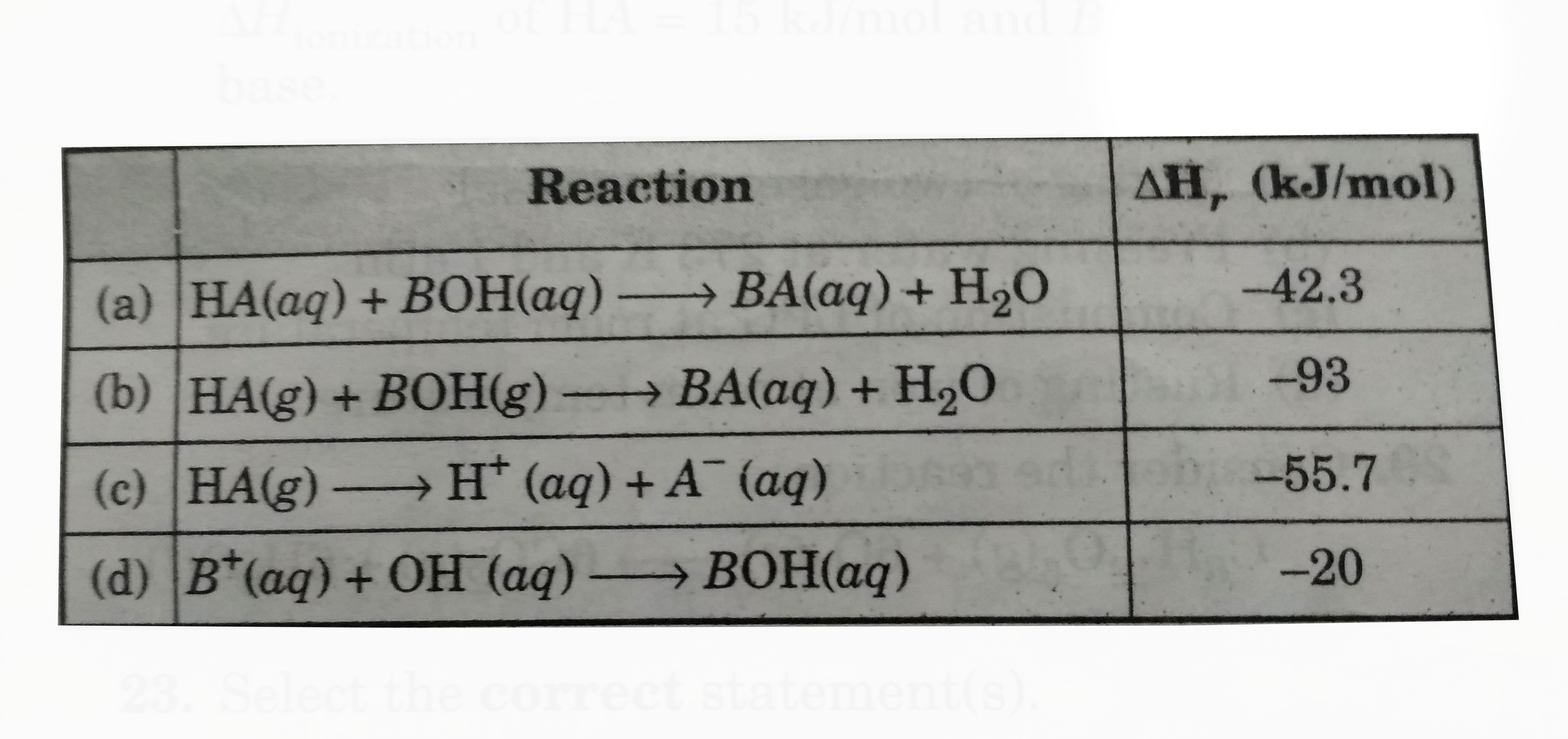From the following date , mark the opation(s) where ΔH is correctly written for the given reaction .
Given: H+(aq)+OH−(aq)→H2O(l),
ΔH=−57.3kJ
ΔHsolutionHA(g)=−70.7kJmole
ΔHsolutionBOH(g)=−20kJmole
ΔHionzatoin of HA=15kJ/mole and BOH is a strong base.

A
ReactionΔHr(KJ/mol)HA(aq)+BOH(aq)→BA(aq)+H2O−42.3
B
ReactionΔHr(KJ/mol)HA(q)+BOH(q)→BA(aq)+H2O−93
C
ReactionΔHr(KJ/mol)HA(q)→H+(aq)=A−(aq)−55.7
D
ReactionΔHr(KJ/mol)B+(aq)+OH−(aq)→BOH(aq)−20
Video Solution
Text Solution
The correct Answer is:A, B, C
(D) BOH(g) + aqueous →B+(aq)+OH−(aq) ΔH=−20KJ/mole
|
Topper's Solved these Questions
- THERMODYNAMICSBOOK - RESONANCECHAPTER - THERMODYNAMICSEXERCISE - exercise-3 part-III Advanced level Solutions (STAGE-I)
6 Videos
- THERMODYNAMICSBOOK - RESONANCECHAPTER - THERMODYNAMICSEXERCISE - exercise-3 part-III Advanced level Solutions (STAGE-II)
45 Videos
- THERMODYNAMICSBOOK - RESONANCECHAPTER - THERMODYNAMICSEXERCISE - exercise-3 part-1 Advanced level Solutions
30 Videos
- TEST SERIESBOOK - RESONANCECHAPTER - TEST SERIESEXERCISE - CHEMISTRY
50 Videos
Similar Questions
Knowledge Check
From the following data, mark the option (s) where ΔH is correctly written for the given reaction. Given:
H+(aq)+OH−(aq)→H2O(l) ΔH=−57.3kJ
ΔHsolution of HA(g)=−70.7 kJ/mol
Δsolution of BOH(g)=20 kJ/mol
ΔHionization of HA=15 kJ/mol & BOH is a strong baseAReactionΔHR (kJ/mole)HA(aq)+BOH(aq)→BA(aq)+H2O−42.3BReactionΔHR (kJ/mole)HA(g)+BOH(g)→BA(aq)+H2O−93CReactionΔHR (kJ/mole)HA(g)→H+(aq)+A−(aq)−55.7DReactionΔHR (kJ/mole)B+(aq)+OH−(aq)→BOH(aq)−20From the following data, mark the option (s) where ΔH is correctlt written for the given reaction. Given
H+(aq)+OH−(aq)→H2O(l),ΔH=−57.3kJ
ΔHsolution of HA(g) = -70.7kJ/mol
ΔHsolution of BOH(g) = 20kJ/mol
ΔHionization of HA = 15 kJ/mol and BOH is a strong base Reaction ΔHr(kJ/mol)AHA(aq)+BOH(aq)→BA(aq)+H2O−42.3BHA(g)+BOH(g)→BA(aq)+H2O−93.0CHA(g)→H+(aq)+A−(aq)−55.7DB+(aq)+OH−(aq)→BOH(aq)−20.0For the reaction,
2H2(g)+O2(g)→2H2O(g),ΔH=−573.2kJ
The heat of decomposition of water per moleA286.6kJB573.2kJC-28.66kJDzero
H2O(l)→H2O(s),ΔH=−6.01kJ
ΔH is the heat of ……………….of water.
View SolutionFor the reaction
2H2(g)+O2(g)→2H2O(g),ΔHө=−573.2kJ
The heat of decomposition of water per mole is
View SolutionH2O(l)→H2O(g) , ΔH=+43.7kJ
H2O(s)→H2O(l) , ΔH=+6.05kJ
The value of ΔH(⊂limation) of ice is
View SolutionThe heat change accompanying the reaction
2H2(g)+O2(g)→2H2O(l) :
ΔH=−136kcal is called
View SolutionIn the reaction
CO2(g)+H2(g)→CO(g)+H2O(g),
ΔH=2.8kJ
ΔH represents
View Solution
